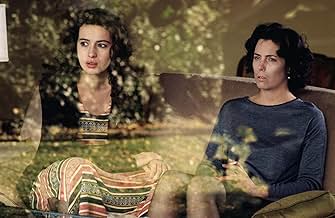Füge eine Handlung in deiner Sprache hinzuMalena's life from adolescence to adulthood, unraveling the history of her family and her own while she is strongly influenced by her older sister.Malena's life from adolescence to adulthood, unraveling the history of her family and her own while she is strongly influenced by her older sister.Malena's life from adolescence to adulthood, unraveling the history of her family and her own while she is strongly influenced by her older sister.
- Auszeichnungen
- 2 wins total
Fotos
Handlung
WUSSTEST DU SCHON:
- SoundtracksNo puedo mirar
Written by Antonio Vega
Ausgewählte Rezension
It is arduously difficult to make a decent film starting from a novel by Almudena Grandes. Besides `Malena' we already have her novel `Las Edades de Lulú' (1990, Bigas Luna) turned into a film - one might say with more pain than glory. Grandes is one of those novelists coming up out of the post-Franco years, and though what she writes is clearly free of taboos, especially those of a sexual nature, her style and quality of writing is poor, to say the least. More or less bred on romantic rosy love-stories by Corín Tellado, Grandes simply puts in the spicy bits and adds her own sexual fantasies and frustrations for good measure. Thus we have both Lulú and Malena coming out of their innocent adolescency into being young women bent on satisfying their sexual desires at any cost, the price being their own self-destruction. And with no doubt, in both cases, Grandes seems equally bent on portraying rather cheaply her own would-have-been appetites. Her language is often crude, reaching extreme vulgarity, which in itself is not precisely appropriate for writing anything of a decent literary level. She is, of course, no D.H. Lawrence... Such that `Malena' might have been a considerably better film if it had started off from superior material. Ariadna Gil as Malena and Marta Belaustégui as her twin sister Reina are impeccable, though Gil was superb two years later in `Lágrimas Negras' (q.v.). However the story just seems to be a revamping of `Lulú' as the basic concepts of a highly sexually-awakened woman is the basic entwining thread. `Malena' wins by having better characterization and perhaps better directing, though this may just be a penchant of mine as I thoroughly dislike Óscar Ladoire in `Lulú' or any other film. And of course it has Ariadna Gil, perhaps the best actress in Spain today. In both `Malena' and `Lulú' one `smells' the inherent `antimachismo' displayed by Grandes; but peculiarly, it is herself who is inadvertently putting her own finger on her outdated concepts, probably due to the fact that a patriarchal masculinism governed her home in her infancy (see: Miguel A. Pérez Abad) which has led her to making men seem like `troglodytes' (ibid.). However, in neither of the two films does this convince, let alone succeed. Quote Almudena Grandes: <<The most important prize for a writer is his readers: it is the only thing that cannot be tampered with and never gets out of date.>> End quote. Yes, that may be so, but we must take into account that most readers in Spain do not have well-founded criteria with which to judge good, mediocre or bad literature. Hopefully Spanish film-makers will leave this writer in peace and not return to her for any further fantasious inspirations.
- khatcher-2
- 15. Sept. 2001
- Permalink
Top-Auswahl
Melde dich zum Bewerten an und greife auf die Watchlist für personalisierte Empfehlungen zu.
Details
- Erscheinungsdatum
- Herkunftsländer
- Offizieller Standort
- Auch bekannt als
- Malena Is a Name from a Tango
- Drehorte
- Produktionsfirmen
- Weitere beteiligte Unternehmen bei IMDbPro anzeigen
- Laufzeit1 Stunde 49 Minuten
- Farbe
- Sound-Mix
Zu dieser Seite beitragen
Bearbeitung vorschlagen oder fehlenden Inhalt hinzufügen

Oberste Lücke
By what name was Malena es un nombre de tango (1996) officially released in Canada in English?
Antwort

















